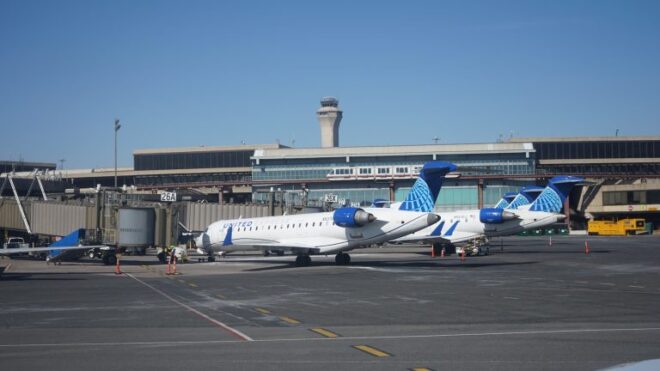
Last month, JetBlue was awarded its first-ever Essential Air Service (EAS) contract in the town of Presque Isle, Maine. In the continental U.S., this contract is worth the most with an annual subsidy of nearly $11 million.
JetBlue, United, American, and Boutique Air bid for the high-value contract. United — the incumbent — proposed service to its Newark hub with 12-weekly flights on a 50-seat CRJ-550. JetBlue proposed and was awarded daily service to Boston on an Embraer E190, and later an Airbus A220.
The New York-based airline put forth the least expensive option out of all the proposals at over $1 million less than the next cheapest. But now United is pushing back on the Department of Transportation (DOT)’s pick to serve Presque Isle, calling the decision “erroneous.” The carrier had been serving the Maine town for six years.
United Claims Decision Was Unfair
In a rather rare move, United is asking the DOT to reconsider, arguing the decision was unfair and not in the public interest.
The crux of the dispute lies in differing service levels. United says its proposal adhered to the initial criteria outlined by the DOT, offering 12 weekly round-trip flights between Presque Isle and Newark. JetBlue, though, secured a waiver to operate with fewer flights.
United contends that the DOT gave undue weight to the recommendation of the Presque Isle City Council, which favored JetBlue. In a letter sent last week, the carrier argues the Council’s decision didn’t reflect the needs of the community, many of whom submitted comments supporting continued service with United.
Further complicating matters is the potential reduction in service for Presque Isle residents. JetBlue’s proposal offers only one daily round-trip flight, whereas United proposed nearly two. This, United claims, could limit travel options and connections for passengers flying out of Presque Isle.
The airline also argues it was placed at a disadvantage by the DOT’s changing requirements. If the department knew it would consider proposals with fewer flights, United says it should have informed bidders beforehand. This would have allowed United to adjust their proposal accordingly.
“The decision was not well-reasoned and ignored the Department’s own data and information submitted on the docket,” the airline said.
In light of these claims, United is requesting the DOT to reconsider its decision and reissue a solicitation with clear and well-defined requirements. Additionally, they want the current EAS order extended until a new carrier is chosen under a revised selection process.